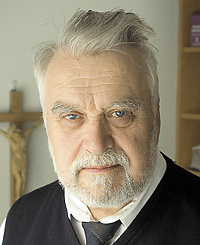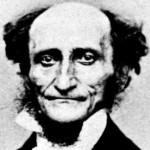…starting in medias res.
The reason why Tuomo Mannermaa’s article is controversial is less theological than political and cultural, though there may be a theological component to it. Part of Mannermaa’s thesis is that Luther’s very realistic understanding of the atonement was forgotten and therefore not present in the Formula of Concord, and that therefore there exists a chasm between Luther and the Formula, as well as Luther and Chemnitz, on the nature of deification. He finds this chasm to be spelled out particularly in the Formula’s condemnation of Osiandrianism.
What Mannermaa fails to see, according to my opinion, is that the Formula does not condemn Osiander’s soteriological realism, but rather it condemns Osiander on two points: firstly, that Osiander taught that Christ’s presence in us is only according to the divine nature, and not according to both, as Lutheran Christology would demand (this topic would be dealt with at length in Chemnitz’s De Duabus Naturis in Christo), and secondly, that Osiander found that logical “reason” for our justification to be found not in the judgment upon Christ qua Mankind on the cross, but upon our inner renewal through the indwelling of Christ. The problem of Osiandrianism is that of “who is the Father looking at when He declares ‘not guilty’”? Is He looking at you with the divine nature renewing you from within (an idea which seems almost a Lutheranized form of Catholicism’s “infused grace”), or is He looking at Christ as the first and fullness of a new humanity?
The second reason for the controversy over Mannermaa is that since his entire theology was developed in the crucible of the dialogue with the Eastern Orthodox, there is suspicion that when Mannermaa speaks of Luther’s doctrine of deification, he is actively trying to make it sound just a little more Orthodox so as to make it appealing to them, as opposed to allowing it to sit in its full Lutheran glory. The main way he does this is in (seemingly) repeating Osiander’s mistake (and the mistake of the Orthodox) and finding the locus of justification in the presently-living Christian who has Christ within him by faith, and not in Christ on the cross, who has Mankind in Him.
The primary question of the Lutheran doctrine of the Forensic Atonement is this: where does God find you righteous?
- If the answer is, “On the cross, where Christ was declared both guilty and righteous, Him becoming one with our guilt, us becoming one with His righteousness,” then you are a Lutheran.
- If the answer is, “Within the sinner who possess Christ by faith and is renewed by Christ’s divinity,” then you are an Osiandrian.
- If the answer is, “Within the sinner who has Christ within him, both as a renewal and as a pledge of God’s good will,” then you are a follower of the Finnish Interpretation.
- If the answer is, “Within the sinner who by participation in the divine energies is purified of all sin and so made pleasing to God,” then you are Eastern Orthodox.
I argue, of course, the first, and so you can see how it differs from the others.
The question would again be put: by what merits are you declared to be righteous?
- If the answer is: “By the merits of Christ depicted in His Incarnation, obedience, passion, death and resurrection, in which we all participate through baptism in faith, and which are truly made ours,” then you are a Lutheran.
- If the answer is: “By new merits gained by Christ through and in us by his indwelling,” then you are some sort of Osiandrian-Finn.
- If the answer is: “By new merits (though they would never use the term merit…) gained by myself as a renewed man through theosis,” then you are Orthodox.
Again, I argue the first.
The final and abiding rule of “what makes it truly Lutheran, &c.” is the question of, “Did Christ finish it already, or is there something to be done, even if Christ ‘does it in or through us’?” The Lutheran answer is to say with Christ “It is finished.” Whether it be justification, sanctification (in the broad sense), deification, glorification, we must be able to say that with Christ in His life, “It is finished.”
+SDG+











